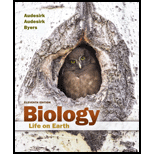
Concept explainers
Evolution is
a. a belief.
b. a scientific theory.
c. a hypothesis.
d. never observed in the modern world.
Introduction:
Evolution is defined as the cumulative genetic change in a population over large stretches of time. It is responsible for the large diversity of organisms present in the earth.
Answer to Problem 1MC
Correct answer:
Evolution is regarded as a scientific theory.
Explanation of Solution
Justification for the correct answer:
Option (b) is given that evolution is a theory that is scientifically proven. It is true as scientists have conducted experiments and confirmed the facts on evolutionary studies based on the fossils, rock studies by radioactive dating, geological studies etc. Hence, option (b) is correct.
Explanation for the incorrect answers:
Option (a) is given that evolution is accounted as a belief. This is wrong. As ‘believing’ is when something is accepted without any evidence. It is not the case for evolution, as scientists have conducted experiments that have confirmed the process of evolution. So, it is an incorrect option.
Option (c) is given that evolution is nothing, but a hypothesis. It is a wrong statement as a hypothesis is given when there is only a little evidence. There is enough experimental evidence given by the scientists in case of evolution. So, it is an incorrect option.
Option (d) is given that the modern world never experiences evolution. This is false. Evolution is a slow process and it happens every minute of every day. This is because organisms that reproduce sexually produce progeny that are a mixture of their parents and thus are not identical. Variations occur in genetic events. If these variations are naturally selected, they become a part of the genome and are passed onto the offspring. So, it is an incorrect option.
Hence, options, (a), (c), and (d) are incorrect.
Thus, it can be concluded that evolution is a well-formed scientific theory that explains how life is diversified.
Want to see more full solutions like this?
Chapter 1 Solutions
Biology: Life on Earth (11th Edition)
- 1. Match each vocabulary term to its best descriptor A. affinity B. efficacy C. inert D. mimic E. how drugs move through body F. how drugs bind Kd Bmax Agonist Antagonist Pharmacokinetics Pharmacodynamicsarrow_forward50 mg dose of a drug is given orally to a patient. The bioavailability of the drug is 0.2. What is the volume of distribution of the drug if the plasma concentration is 1 mg/L? Be sure to provide units.arrow_forwardDetermine Kd and Bmax from the following Scatchard plot. Make sure to include units.arrow_forward
- Choose a catecholamine neurotransmitter and describe/draw the components of the synapse important for its signaling including synthesis, packaging into vesicles, receptors, transporters/degradative enzymes. Describe 2 drugs that can act on this system.arrow_forwardThe following figure is from Caterina et al. The capsaicin receptor: a heat activated ion channel in the pain pathway. Nature, 1997. Black boxes indicate capsaicin, white circles indicate resinferatoxin. a) Which has a higher potency? b) Which is has a higher efficacy? c) What is the approximate Kd of capsaicin in uM? (you can round to the nearest power of 10)arrow_forwardWhat is the rate-limiting-step for serotonin synthesis?arrow_forward
 Concepts of BiologyBiologyISBN:9781938168116Author:Samantha Fowler, Rebecca Roush, James WisePublisher:OpenStax College
Concepts of BiologyBiologyISBN:9781938168116Author:Samantha Fowler, Rebecca Roush, James WisePublisher:OpenStax College Human Biology (MindTap Course List)BiologyISBN:9781305112100Author:Cecie Starr, Beverly McMillanPublisher:Cengage Learning
Human Biology (MindTap Course List)BiologyISBN:9781305112100Author:Cecie Starr, Beverly McMillanPublisher:Cengage Learning Biology Today and Tomorrow without Physiology (Mi...BiologyISBN:9781305117396Author:Cecie Starr, Christine Evers, Lisa StarrPublisher:Cengage Learning
Biology Today and Tomorrow without Physiology (Mi...BiologyISBN:9781305117396Author:Cecie Starr, Christine Evers, Lisa StarrPublisher:Cengage Learning Biology 2eBiologyISBN:9781947172517Author:Matthew Douglas, Jung Choi, Mary Ann ClarkPublisher:OpenStax
Biology 2eBiologyISBN:9781947172517Author:Matthew Douglas, Jung Choi, Mary Ann ClarkPublisher:OpenStax Biology (MindTap Course List)BiologyISBN:9781337392938Author:Eldra Solomon, Charles Martin, Diana W. Martin, Linda R. BergPublisher:Cengage Learning
Biology (MindTap Course List)BiologyISBN:9781337392938Author:Eldra Solomon, Charles Martin, Diana W. Martin, Linda R. BergPublisher:Cengage Learning Biology: The Dynamic Science (MindTap Course List)BiologyISBN:9781305389892Author:Peter J. Russell, Paul E. Hertz, Beverly McMillanPublisher:Cengage Learning
Biology: The Dynamic Science (MindTap Course List)BiologyISBN:9781305389892Author:Peter J. Russell, Paul E. Hertz, Beverly McMillanPublisher:Cengage Learning





